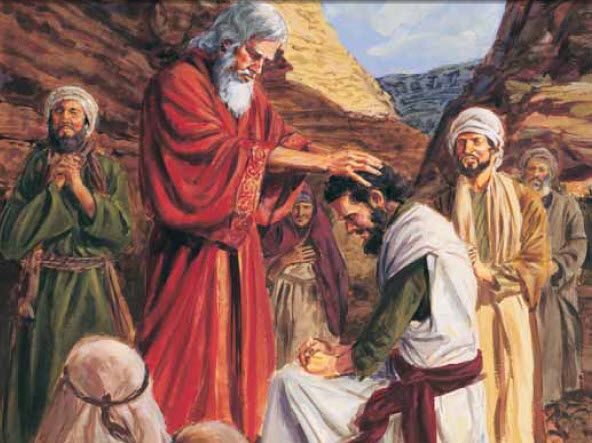This article is part of a series on Old Testament Christophanies. For important background information, see An Introduction to Old Testament Christophanies–with Justin Martyr. It is especially useful to read the article on Jesus in Exodus 23.

Justin Martyr, the famed second-century church father, understood that it was the Son speaking to Moses from Sinai. And in his study of Exodus 23:20–21, he perceived something deeper:
“Moreover, in the book of Exodus we have also perceived that the name of God Himself, which, He says, was not revealed to Abraham or to Jacob, was Jesus, and was declared mysteriously through Moses.”[1]
This is an astonishing claim to make: God’s name was revealed to be Jesus in the Old Testament! If this was said by almost anyone else, it would be understandable to disregard the claim and move on to another teacher. But this is Justin Martyr, one of the most renowned and respected Christian thinkers of all time. At the very least we need to consider his argument.
Justin continued:
Thus it is written: ‘And the Lord spake to Moses, Say to this people, Behold, I send My angel before thy face, to keep thee in the way, to bring thee into the land which I have prepared for thee. Give heed to Him, and obey Him; do not disobey Him. For He will not draw back from you; for My name is in Him.’ Now understand that He who led your fathers into the land is called by this name Jesus, and first called Auses (Oshea). For if you shall understand this, you shall likewise perceive that the name of Him who said to Moses, ‘for My name is in Him,’ was Jesus. For, indeed, He was also called Israel, and Jacob’s name was changed to this also. Now Isaiah shows that those prophets who are sent to publish tidings from God are called His angels and apostles. For Isaiah says in a certain place, ‘send me.’ And that the prophet whose name was changed, Jesus [Joshua], was strong and great, is manifest to all.[2]
In Isaiah 49:3, one of the Messiah’s names is revealed to be Israel. Messiah Jesus is the personal embodiment of everything that Israel was supposed to be. Only He was able to fulfill the law and the prophets (Matt 5:17), becoming a light to the world. After Jacob wrestled with the Son of God, his name was changed to Israel, which means “he who strives with God” or “a prince of God.” As the father of the twelve tribes, Jacob represents all of Israel. In this sense he is a type pointing to the Messiah. Justin contends that the same pattern can be found in Joshua. Joshua too was visited by the Son of God (Josh 5:13–15). There we find that as the captain of Israel’s army, Joshua was a type pointing to the Son as the captain of heaven’s army. And in Numbers 13:16, Moses (no doubt inspired by the Holy Spirit) renamed Hoshea, Joshua. His name went from meaning “he was saved” to “Yahweh is salvation.” The English names Joshua and Jesus both correspond to the same Hebrew name. So what Justin is arguing is that just as Jacob’s new name revealed one of the names of the Messiah, the Son of God, to be Israel, Hoshea’s new name revealed one of them to be Jesus.
Although Justin interpreted the “angel” (messenger) in Exodus 23:20 as Joshua, his argument still applies. As a messenger who went before Israel into Canaan (Num 13), Joshua is a type pointing to the Angel of the Lord who went before Israel in the wilderness (Judg 2:1). After His incarnation, the Angel of the Lord would come to be known as Jesus. Justin may not have given us absolute proof, but even the possibility that the Lord mysteriously revealed the name of the Son of God through Moses is fascinating.
Justin followed his argument with a question, one which underscores the power and importance of Old Testament Christophanies:
If, then, we know that God revealed Himself in so many forms to Abraham, and to Jacob, and to Moses, how are we at a loss, and do not believe that, according to the will of the Father of all things, it was possible for Him to be born man of the Virgin, especially after we have such Scriptures, from which it can be plainly perceived that He became so according to the will of the Father?[3]
[1] Justin Martyr, Dialogue with Trypho 75.1.
[2] Ibid.
[3] Ibid.

Leave a Reply